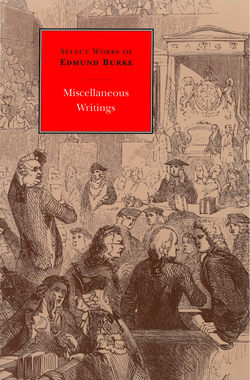Читать книгу Miscellaneous Writings - Edmund Burke - Страница 13
На сайте Литреса книга снята с продажи.
ОглавлениеSPEECH ON THE REFORM OF THE REPRESENTATION OF THE COMMONS IN PARLIAMENT
[May 7, 1782]
On this day, William Pitt the Younger (1759–1806) made a motion in the House of Commons for a committee to inquire into the state of the representation of the Commons in Parliament. The geographical distribution of seats in the House of Commons had changed little in centuries (and was not to be changed until 1832). The right to send representatives to Parliament was therefore a product of history and conformed to no discernible rational pattern. Populous cities of recent growth elected no members of Parliament, while “decayed,” thinly populated, old boroughs elected two; counties suffered disparities, since large counties had only two members of Parliament, just as small ones did. In addition, seats in the Commons were shamelessly bought and sold.
A demand for the reform and more even distribution of the representation of the people had been first formulated only a decade earlier. The parliamentary reform movement was at the beginning not a widely popular one; the great unrepresented towns showed no enthusiasm for it. England was still a predominantly agricultural country ruled by a landholding aristocracy, and the nation was content to have it so. Even the reformers, by and large, sought only moderate changes in the representative system, but the American, and later the French, revolutions fostered radical ideas of democracy based on the natural right of individual men to govern themselves. It was characteristic of Burke that he focussed his attention on this radical ideology and attacked it as a deadly threat to the aristocratic constitution under which England had flourished for so long.
Yet Burke, and the Rockingham Whigs whose spokesman he was, were, in their own way, reformers. As they saw the matter, the corruption of politics was due to the undue influence of the Crown on elections to and votes in Parliament. To reduce this influence, Burke had proposed his “economical reform” bill in 1780 (little of which was actually passed). It sought to eliminate many of the sinecure jobs in the royal household (which could be held by members of Parliament) and to trim the king’s civil list, which the Treasury used as a campaign fund in parliamentary elections. Farther than that, however, the Rockingham Whigs refused to go.
This attitude explains both why Burke wrote his speech on Pitt’s motion and why it was never delivered. The Parliamentary History of England shows that Pitt made his motion on the 7th of May and that it was debated and rejected on that day but makes no mention of a speech by Edmund Burke. The reason probably is that on the preceding day Burke had gotten leave to introduce another economical reform bill, and his friends dissuaded him from alienating Pitt by attacking his motion, since they wanted his support for economical reform.
Burke later wrote what is at least an initial draft of the speech he would have given, but never published it. His literary executors found it among his papers after his death and published it in volume 10 of their edition of his Works, from which the following document is taken. Incomplete though it is, it is presented here because of the important contribution it makes to our understanding of Burke’s political theory and of his idea of representation in particular.
